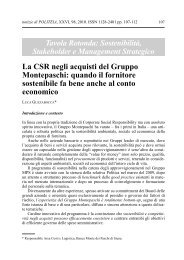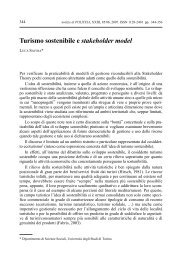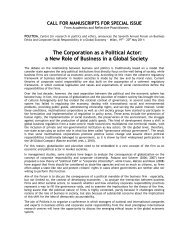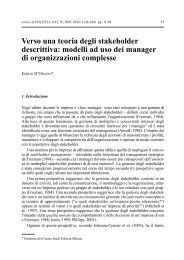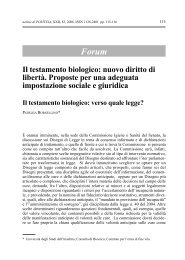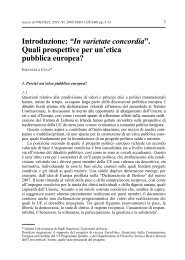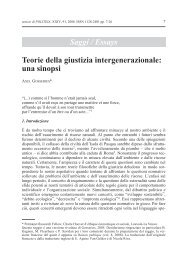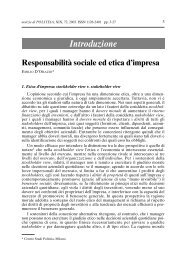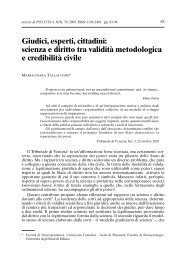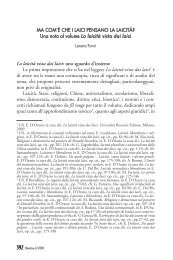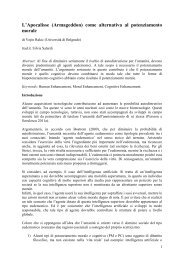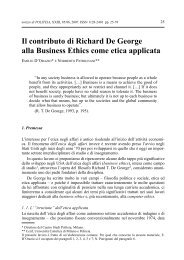Premio alla Filosofia Morale, Thomas Nagel e il Premio ... - Politeia
Premio alla Filosofia Morale, Thomas Nagel e il Premio ... - Politeia
Premio alla Filosofia Morale, Thomas Nagel e il Premio ... - Politeia
You also want an ePaper? Increase the reach of your titles
YUMPU automatically turns print PDFs into web optimized ePapers that Google loves.
notizie di POLITEIA, XXIV, 92, 2008. ISSN 1128-2401 pp. 3-4 3<br />
<strong>Premio</strong> <strong>alla</strong> f<strong>il</strong>osofia morale<br />
<strong>Thomas</strong> <strong>Nagel</strong><br />
e <strong>il</strong> <strong>Premio</strong> Balzan 2008<br />
Sono stati consegnati <strong>il</strong> 21 novembre 2008 a Roma dal Presidente della Repubblica<br />
Italiana i Premi Balzan 2008. Il premio <strong>alla</strong> f<strong>il</strong>osofia morale è stato assegnato a<br />
<strong>Thomas</strong> <strong>Nagel</strong>: “per i suoi fondamentali e innovativi contributi <strong>alla</strong> teoria etica contemporanea,<br />
sia nell’ambito delle scelte personali e individuali sia nell’ambito delle<br />
scelte collettive e sociali”. Qui di seguito viene pubblicato <strong>il</strong> Discorso di accettazione<br />
del <strong>Premio</strong> di <strong>Thomas</strong> <strong>Nagel</strong> preceduto d<strong>alla</strong> Presentazione di Salvatore Veca –<br />
membro del Comitato generale Premi della Fondazione Internazionale Balzan.<br />
Presentazione<br />
SALVATORE VECA*<br />
Per i suoi fondamentali e innovativi contributi <strong>alla</strong> teoria etica contemporanea, sia<br />
nell’ambito delle scelte personali e individuali sia nell’ambito delle scelte collettive<br />
e sociali. Per la profondità e la coerenza della sua originale prospettiva f<strong>il</strong>osofica,<br />
incentrata sulla tensione essenziale fra un punto di vista oggettivo e impersonale e<br />
un punto di vista soggettivo e personale. Per l’originalità e la fecondità del suo<br />
approccio f<strong>il</strong>osofico ad alcune fra le più importanti questioni di vita contemporanee.<br />
Professore di <strong>F<strong>il</strong>osofia</strong> e diritto <strong>alla</strong> New York University, <strong>Thomas</strong> <strong>Nagel</strong> è uno dei<br />
più autorevoli f<strong>il</strong>osofi contemporanei. A partire d<strong>alla</strong> metà degli anni Sessanta del<br />
secolo scorso la sua ricerca ha messo a fuoco, in numerosi e fondamentali contributi,<br />
un’amplissima gamma di problemi in una varietà essenziale di ambiti. Al centro<br />
della sua impresa f<strong>il</strong>osofica vi è una tesi originale e feconda. Essa consiste nel riconoscimento<br />
di una tensione essenziale fra differenti punti di vista che noi possiamo<br />
assumere nel vivere le nostre vite: la tensione fra una prospettiva oggettiva e impersonale<br />
e una prospettiva soggettiva e personale. Questa tensione genera i problemi<br />
* Vice direttore IUSS, Pavia.
4<br />
Presentazione<br />
genuinamente f<strong>il</strong>osofici, e investe tanto le nostre ragioni per credere quanto le nostre<br />
ragioni per agire.<br />
In questo quadro di sfondo, sin dal suo primo libro The Possib<strong>il</strong>ity of Altruism<br />
(1970), <strong>Thomas</strong> <strong>Nagel</strong> si è misurato con i problemi della teoria etica, offrendo una<br />
prospettiva in cui le ragioni oggettive e impersonali hanno un ruolo decisivo per<br />
orientarci nelle nostre scelte morali.<br />
La dimensione etica delle nostre scelte personali e delle scelte sociali è al centro<br />
del libro del 1979, Mortal Questions. Questioni di vita individuale quali l’esperienza<br />
dell’assurdo, la sorte morale, la morte, la perversione sessuale si intrecciano con i<br />
d<strong>il</strong>emmi della scelta sociale, esaminati nei capitoli dedicati a guerra e massacro,<br />
all’interpretazione dell’eguaglianza, alle politiche della preferenza. Nell’ultimo capitolo<br />
su Soggettivo e oggettivo <strong>Thomas</strong> <strong>Nagel</strong> suggerisce in che senso la tensione fra<br />
punto di vista oggettivo e soggettivo possa consentirci di individuare connessioni, a<br />
prima vista inaspettate, fra differenti ambiti e differenti problemi.<br />
The View from Nowhere (1986) è <strong>il</strong> tentativo più sistematico di mettere <strong>alla</strong> prova<br />
la fecondità della tesi centrale. <strong>Thomas</strong> <strong>Nagel</strong> esamina le questioni della mente, del<br />
rapporto fra mente e corpo, della conoscenza e approfondisce la sua prospettiva etica<br />
nell’ambito dell’interpretazione della libertà, del valore, del giusto e del bene, sino<br />
alle domande a proposito del significato delle nostre vite finite.<br />
Numerosi libri, quali Equality and Partiality (1991), Other Minds: Critical<br />
Essays (1995), Concealment and Exposure (2002) e The Myth of Ownership: Taxes<br />
and Justice (con Liam Murphy, 2002) sv<strong>il</strong>uppano e arricchiscono la sua prospettiva<br />
f<strong>il</strong>osofica su temi importanti di teoria politica e morale. Un fondamentale saggio,<br />
uscito nel 2005 sulla rivista “Ph<strong>il</strong>osophy and Public Affairs”, The Problem of Global<br />
Justice, ha avviato una significativa e ricca controversia su quella che può essere<br />
definita la sfida più diffic<strong>il</strong>e e al tempo stesso ineludib<strong>il</strong>e per la f<strong>il</strong>osofia politica e<br />
morale contemporanea.<br />
<strong>Thomas</strong> <strong>Nagel</strong> ha difeso in un suo libro del 1997, The Last Word, <strong>il</strong> ruolo e la<br />
portata della ragione, contro ogni forma di relativismo e decostruzionismo, e ha<br />
espresso la sua profonda passione per la f<strong>il</strong>osofia in un piccolo capolavoro di chiarezza<br />
e concisione: What Does It All Mean A Very Short Introduction to Ph<strong>il</strong>osophy.<br />
La f<strong>il</strong>osofia, ci ricorda <strong>Thomas</strong> <strong>Nagel</strong>, è l’infanzia dell’intelletto e una cultura matura<br />
che non ne sia consapevole è una cultura più povera per tutti.<br />
Concludendo un superbo saggio su Platone e l’invenzione della f<strong>il</strong>osofia, Bernard<br />
W<strong>il</strong>liams ha fatto una piccola lista delle grandi virtù del f<strong>il</strong>osofo. Nella lista sono<br />
elencate nell’ordine: intelligenza penetrante e profondità, conoscenza del sapere<br />
scientifico, un senso vivo della distruttività politica e umana così come della creatività<br />
umana e politica, un’ampia gamma di interessi tematici e un’immaginazione<br />
vivida, <strong>il</strong> rifiuto intellettuale di dedicarsi a pratiche di rassicurazione superficiali, <strong>il</strong><br />
dono della grande scrittura. Platone, secondo W<strong>il</strong>liams, è <strong>il</strong> f<strong>il</strong>osofo che ha esemplificato<br />
al massimo grado la realizzazione congiunta dell’insieme delle virtù elencate<br />
nella piccola lista. Sono convinto di poter concludere sostenendo che l’opera f<strong>il</strong>osofica<br />
di <strong>Thomas</strong> <strong>Nagel</strong> mostra certamente un buon grado di approssimazione all’ideale<br />
della piccola lista delle grandi virtù.
notizie di POLITEIA, XXIV, 92, 2008. ISSN 1128-2401 pp. 5-6 5<br />
Acceptance Address<br />
THOMAS NAGEL*<br />
Mr. President, Members of the Balzan Foundation, Ladies and Gentlemen, It is a great<br />
honor to be here, and to be included in the extraordinar<strong>il</strong>y diverse and distinguished<br />
company of recipients of the Balzan Prize over the years. I am particularly grateful<br />
for the recognition given to the field of moral ph<strong>il</strong>osophy by the decision to award a<br />
prize in that category this year. That serves as an acknowledgment of the great<br />
development and growth of the subject in our time. Not only moral ph<strong>il</strong>osophy, but<br />
its application to political theory, ph<strong>il</strong>osophy of law, and questions of public policy<br />
have been among the most important recent areas of ph<strong>il</strong>osophical activity and<br />
influence.<br />
I entered the field of ph<strong>il</strong>osophy at a fortunate time. After a long fallow period,<br />
caused, I believe, by the combined influence of logical positivism and Marxism,<br />
both in their different ways skeptical about the usual forms of moral thought,<br />
ph<strong>il</strong>osophy began in the second half of the twentieth century to take substantive<br />
moral and political questions seriously again. When I was an undergraduate at<br />
Cornell University in the 1950’s, I studied with John Rawls, who was then<br />
beginning the work on his theory of justice that would transform the subject<br />
radically. What I received from him above all was the conviction that ph<strong>il</strong>osophical<br />
ethics was not limited to the analysis of moral concepts and moral language, and that<br />
it was possible to think rationally about first-order questions of morality and justice<br />
in a way that respects their complexity. I then spent two years at Oxford, where I<br />
encountered Ph<strong>il</strong>ippa Foot, whose work on ethics and motivation made a deep<br />
impression on me, and H. L. A. Hart, who was initiating a great opening up of legal<br />
ph<strong>il</strong>osophy with his lectures which became The Concept of Law and his reflections<br />
on the legal enforcement of morals, which would appear as Law, Liberty, and<br />
Morality. I returned to the United States, to Harvard, to complete my graduate<br />
studies, with Rawls as my supervisor (for he had moved there). He was completing<br />
his great work, A Theory of Justice, and discussed it in draft with his students.<br />
Moral, political, and legal ph<strong>il</strong>osophy were set on a new course by these figures,<br />
and the humanistic aspect of ph<strong>il</strong>osophy became in consequence an important part of<br />
the analytic tradition that was and st<strong>il</strong>l is dominant in the English-speaking world. I<br />
have been lucky to have as colleagues and friends a number of ph<strong>il</strong>osophers who, in<br />
the words of Bernard W<strong>il</strong>liams, pursued “ph<strong>il</strong>osophy as a humanistic discipline” and<br />
for whom moral ph<strong>il</strong>osophy was a central part of the subject: W<strong>il</strong>liams himself,<br />
Ronald Dworkin, David Wiggins, Robert Nozick, T. M. Scanlon, and Derek Parfit,<br />
* New York University.
6 Acceptance Address<br />
among others. One connection has been particularly sustained and fruitful: for the<br />
past twenty years, at New York University, Ronald Dworkin and I have conducted a<br />
colloquium in Law, Ph<strong>il</strong>osophy, and Social Theory, to which we have invited many<br />
of the significant contributors to these fields for discussion of their work in progress,<br />
and to which we have also presented our own writings.<br />
I have worked in other fields, notably the ph<strong>il</strong>osophy of mind and the theory of<br />
knowledge, but this community of individuals with a common interest in real moral,<br />
political, and legal questions, and a belief that it was possible to make progress on<br />
such questions by reason, argument, and analysis, has probably been my main<br />
intellectual home. Ph<strong>il</strong>osophy is essentially a solitary enterprise, but we would meet<br />
and comment on drafts of each other’s work, and a common set of problems was<br />
treated from different points of view. These problems included the relation between<br />
liberty and equality as social and political ideals; the degree of impartiality among<br />
persons that morality demands, and its relation to the demands of personal life and<br />
personal attachments; the basis of individual rights, and of the strict prohibitions on<br />
certain ways of treating people, even as a means to worthwh<strong>il</strong>e ends. We were<br />
concerned also with the pressing public questions of our time that are related to<br />
these more abstract problems: the legitimate grounds and methods of warfare; the<br />
way state power could legitimately be used to promote economic equality; the<br />
appropriate response to inequality between the races, and between the sexes; the<br />
relation between religion and the state; and the culturally sensitive issues of sexual<br />
freedom and abortion. I don’t suppose we have had much impact on public policy,<br />
but we have made it possible for the ph<strong>il</strong>osophical aspect of all these issues to play a<br />
part in the teaching of the subject at universities, and some of the discussion has<br />
extended into other fields, notably law, economics, and political science.<br />
Through ph<strong>il</strong>osophy I have made connections all over the world, particularly as the<br />
interest in developments in moral and political theory grew and spread, in conjunction<br />
with the growing influence of the values of constitutional democracy and human<br />
rights. It has been a moving experience to take part in debates about these subjects in<br />
Hungary, Russia, China, Argentina, and South Africa, during periods of political<br />
transition. But the ph<strong>il</strong>osophical friendships I have formed in Italy, France, and<br />
Germany as well as in other countries are also due to this spread of ideas.<br />
I remember with particular pleasure, for example, a conference in Napoli<br />
organized by Sebastiano Maffettone, and a late-night discussion on that occasion in<br />
the bar of the Santa Lucia Hotel with John Rawls and Ronald Dworkin, at which<br />
Salvatore Veca was also present; perhaps he remembers it too. Rawls mentions the<br />
occasion in the Introduction to his book, Political Liberalism.<br />
It is a great honor to accept the Balzan Prize in Moral Ph<strong>il</strong>osophy, and I would like<br />
to accept it not just for myself, but as an honor to the community of ph<strong>il</strong>osophers who<br />
have brought this subject to life in our time, including some of the best, like John<br />
Rawls, Bernard W<strong>il</strong>liams, and Robert Nozick, who are no longer with us.



